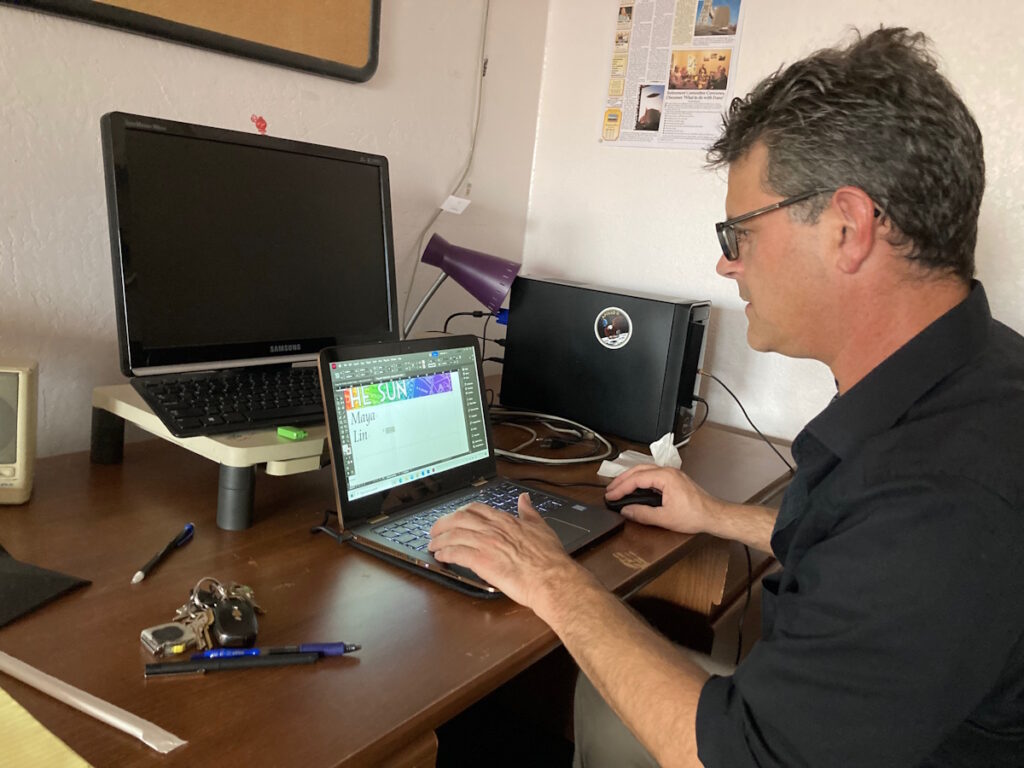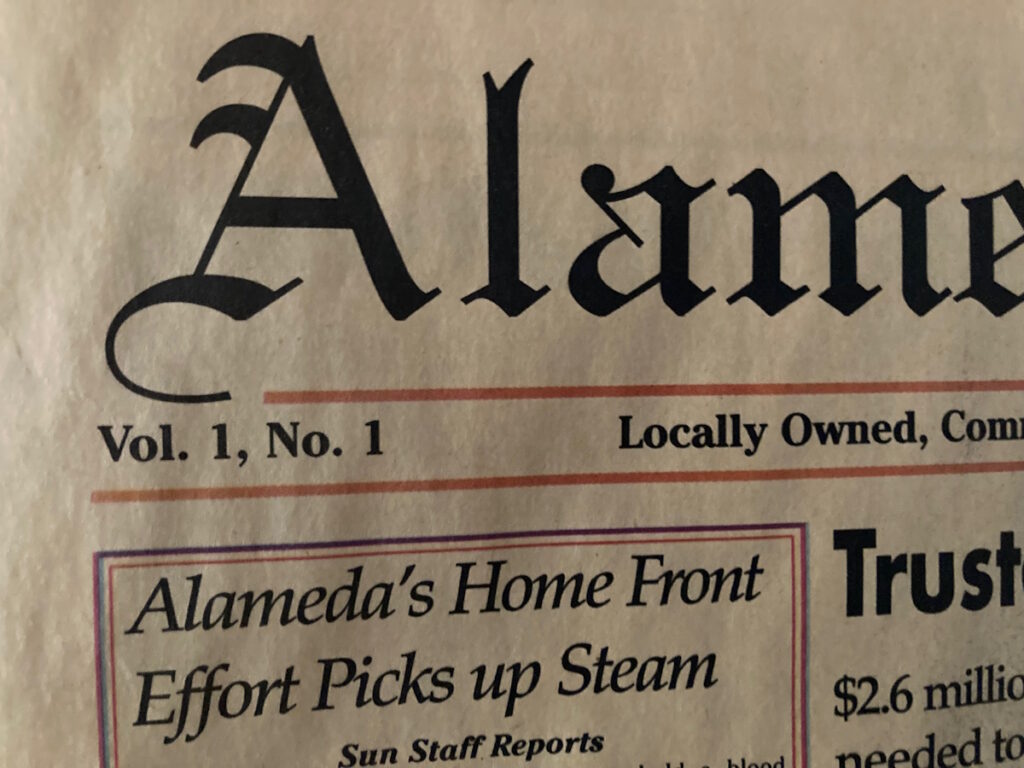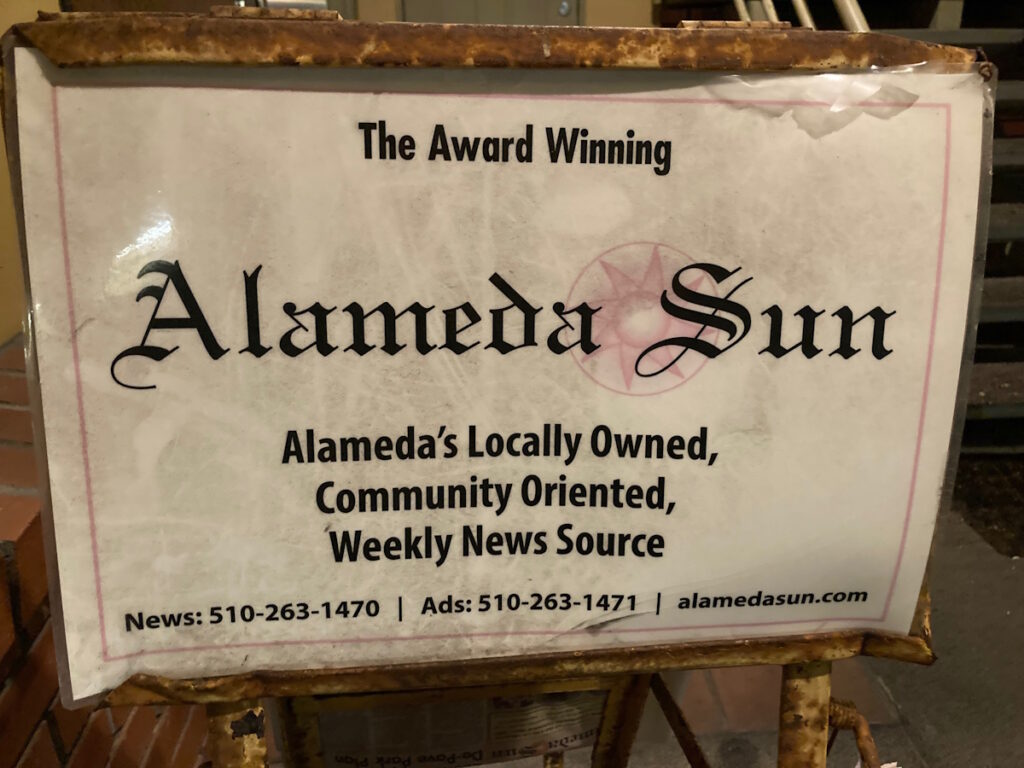Alameda Sun’s Last Print Issue Hit Stands On November 30 ; Digital To Fold At Close of Year
By Larry Freeman

The well-practiced hands of Eric J. Kos, Publisher of The Alameda Sun, a longstanding fixture of homegrown local news, did their keyboard dance to lay out the Police Blotter page of his paper at 11:07 a.m. on November 13.
On the surface, it was just another micro moment in a 23 year work ritual performed so many hundreds of times before, more of a square dance than a tango in this instance.
But this time, it was also the next to the last curtain call for Kos, his news enterprise, and Alameda news consumers who still want to have an actual set of paper pages in their hands to thumb through.
The time bell had already tolled.
On November 16, a 13 ¾ column inch story below the fold at the bottom right front page corner of the Sun’s once a week print edition unceremoniously presented a cold, fact centered headline, that side-stepped the obvious, metaphoric cliché that could have been.
Why make light of something so dim?
“Update: Sun Will Cease Operations by Year End.”
If The Sun’s reporting of its imminent demise was not as a marked event writ large, neither was the Alameda public’s reaction to and support for the endeavor undertaken by Publisher Eric Kos and another founding partner in the year 2000, according to Kos on one of The Sun’s twilight days.

Kos shared his perspective that too few people understand and appreciate the elemental value of news, much less the grit and grind required to take up the torch of shedding light on community affairs.
“ I ask my fellow Alamedans what they have done? Did they advertise even once?”
Eric Kos, Publisher
“Some of the communication I’ve received since the announcement asks if I have tried everything to save The Sun. I ask my fellow Alamedans what they have done? Did they advertise even once? “
The hurt and sting of being undervalued by a public increasingly tied to rapidly moving trivialities, fluff, hearsay and misinformation on social media resonated during the interview.
“Reading the news is like eating your vegetables.”
Kos
Kos suggests that the ‘empty calorie’ info diet of far too many, who don’t care to pay to support the work involved in creating news journalism, may be reflective of a culture with no real appetite for, nor dedication to, supporting fact based news, much less public engagement.
“Reading the news is like eating your vegetables. Everyone would much rather breeze through junk news on social media,” said Kos.
“No one wants to take it seriously because then you might have to DO something like protest or write your congressperson. ‘The news is trying to urge me to get up off my couch and DO something, and frankly, I’m not interested,’ “ he said with resignation and a hint of disdain for ‘couch potato,’ vapid info consumers.
Kos used an old metric in the political world and journalism biz, one that postulates that for every letter to the editor written, ten more people with the same basic view sat on the sidelines, and did not write in.
“I’ve received about 20 letters from people concerned about the loss of the Alameda Sun. So by that equation I guess it affects about 200 people. Not a huge loss, Kos said flatly.
What began as a venture with high hopes of gaining traction to fulfill the mission of community news journalism to empower the community with important information also began as a business that faced headwinds early on.
“The prospect of the Sun ending existed from day one” said Kos.
“ I remember early in 2002 we ran out of our starting capital and almost gave up then. Luckily, my partner and I came up with an advertising idea that sustained us for a few years until we had to come up with another new idea for the community to latch onto, ad infinitum. Today, all founding members have left except me. “
“The financial impact of the shutdown was insurmountable. Delegating responsibility to remote actors proved foolish,” Kos said.
The battles and burdens of being a business have perennially plagued the news world, from cost conscious corporate media bean counters trying to generate profits for shareholders or owners straight down to the little homegrown operations as The Sun.
Kos took aim at more than the indifference of businesses and community organizations at large to provide ad revenues. He pointed straight at City Hall.
Ad revenues are key to offsetting the daunting overhead of running a digital publication, much less a vastly more expensive print paper, and that inflow dwindled over time.
Kos and family sunk tens of thousands of dollars from their own pockets to keep the paper afloat but, after a time, realized that the load was too much to bear
The rise of social media and the dwindling appetite of folks willing to pay to be news consumers also took their toll on The Sun.
The Sun’s tenet that their ‘real’ print edition newspaper could be a surviving member of an endangered species confronted with massive, ongoing fiscal headwinds.
“The City of Alameda cancelled all of its display advertising. The loss of the Earth Day Festival Program and July Fourth Parade Program in particular were devastating.”
Kos
But adequate community support for the endeavor didn’t pan out over the long haul.
Kos took aim at more than the drop off in support from local businesses and community organizations at large for the decline. He pointed straight at City Hall.
“The City of Alameda cancelled all of its display advertising. The loss of the Earth Day Festival Program and July Fourth Parade Program in particular were devastating losses. All of the City’s event advertising and self-promotion went online to their social media, depriving the Alameda Sun of its largest and best display advertising customer, “ lamented Kos.
City Departments and elected officials might well see the matter differently, especially in an environment in which how taxpayer dollars are spent and towards what end and effectiveness are always at issue.
In this case, a fiscally conservative move to cost cut by the City had an adverse impact on a community enterprise that serves the purposes of The First Amendment.
One unfortunate result is that there is one less news journalism entity in town to keep an eye on just how The City’s public funds are being spent and managed.
“I’ll never forget “First Responders Watch Man Die,” –a tragic story that ripped Alameda city government and agencies
Kos
A standout story in The Sun’s ‘watchdog’ role of shedding light on City matters and probing behind the scenes had to do with a hauntingly tragic event that took place in the Bay waters just off of the beach at South Shore on Memorial Day in 2011.
The bizarre tragedy of inaction by public safety personnel leading to a suicidal Raymond Zack’s needless death generated hundreds of scandal story headlines and reports all over the nation and elsewhere, including The New York Daily News and London’s “Daily Mail
Kos recalls the whole disaster that ripped city government and agencies with floods of criticism, denial, finger pointing, public outrage, disgust and admissions of policy failure.
“I’ll never forget “First Responders Watch Man Die,” back in 2011 when Alameda firefighters and police let Raymond Zack die of hypothermia in San Francisco Bay. It’s a long painful story and there was a documentary made about it that features me. “Shallow Waters: The Public Death of Raymond Zack” … what I said in that documentary are some of the most important words I’ve ever said,” reflected Kos.
The story reverberated for years, a special investigation took place and needed policy changes have since been enacted in the wake of press scrutiny including that of The Sun.
Another Sun story “blatantly exposed corruption at City Hall”
Kos
Kos recounted another major instance where The Sun and other local press unearthed a scandal at City Hall that shook Alameda as well as one that ironically underscores how fascination with social trivialities can supplant the guts of the news due to an errantly worded headline.
“One that stands out is ‘City Manager Tapes Head to District Attorney’ … April 19, 2018. That one went viral. Not because it was Ekene Ikeme’s (then a staff reporter and now editor of The Sun) finest moment in Alameda journalism;
Not because of the import of the story blatantly exposed corruption at City Hall. It went viral because of the “crash blossom” double meaning of the headline. Alameda Sun’s only brush with internet fame,” Kos mused.
This particular, highly complex scandal story resulted in an Alameda Grand Jury investigation which concluded that two City Council members at the time, Jim Oddie and then Vice Mayor Malia Vella (who currently serves on the council) violated the Alameda City Charter and were guilty of engaging in “a pattern of conduct… that, taken together, amounted to inappropriate interference in the fire chief hiring process.”
The mess resulted in the departure of then City Attorney Jill Keimach amidst allegations of her making an unlawful audio recording of a meeting with key participants in the fire chief hiring matter. The lawfulness of the recording was not resolved, Keimach was placed on administrative leave and eventually left her post after The City paid a $ 945,000 separation agreement.
Bittersweet End To It All: “Stack of dusty papers”
As one would expect from a ‘newspaperman,’ as the old label goes, Kos looks back with a fair measure of pride amidst the sea of angst and disappointment at The Sun’s demise.
“We marked many significant occasions both official and personal. We celebrated achievements and criticized wrongdoing. We mourned when your family members died. We remembered things long forgotten. We gave every Alamedan’s voice a free forum. We distributed information freely regardless of economic status.”
But the story doesn’t quite end in a comforting, romantic ‘ride off into the sunset’ storyline.
News is often about ‘hard knocks, ’ and when it comes to whether or not Kos thinks he will miss that which has been such a deep part of his and his family’s DNA, he rode off into a gloomy gray of twighlight.
“Right now. I’m thrilled to be done with it”, he said, trailing into –“what I miss? …I can probably come up with 50 or so people who have passed on that helped the Sun tremendously and aren’t ever coming back.”
And, in what ought to be an undeserved, glum, final epitaph for a paper that sought to serve so well in an arena where respect and appreciation are hard won and short lived, Kos described his and The Sun’s legacy as “a stack of dusty papers heading to the Alameda Free Library as a free donation. Future generations may or may not care.”

